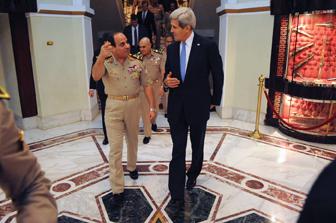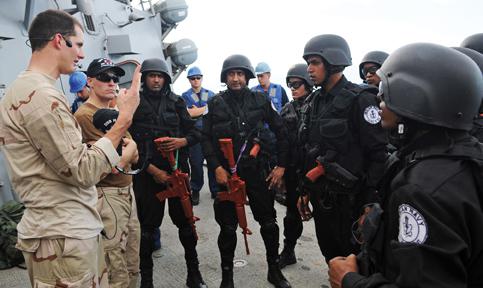Elections in India, Egypt Impact Western Interests
Two countries that provide stability in their regions, though often on the brink of battle with rival neighbors, elected new leaders in May, influencing how geopolitics will move forward in the second decade of the 21st century. Their relationships with the West will affect military and economic decisions, and their vastly different political systems will require sensitive political handling.
Egypt has the more volatile system, recovering from two government overthrows since 2011. A series of mass killings between the Muslim Brotherhood and the military-ruled government has occurred since then, along with mass arrests and execution orders. India, more stable politically, has had issues with citizen violence, most publicly, the problem of gang rapes and police apathy in certain regions. It additionally has a nuclear arsenal and shares a border with longtime adversary Pakistan, also a nuclear power.
India’s elections took six weeks to conduct, and the overwhelming victory of the Bharatiya Janata Party (BJP) means some major changes for the country as its internal politics are expected to move considerably to the right with a focus on nationalism. The change in leadership demands attention not only because of the nation’s nuclear arsenal, but also because the country is important to U.S. businesses and the military. Narendra Modi of the BJP assumes the role of prime minister and has a pro-business outlook along with U.S.-Indian business friends. He campaigned on ideas of reviving an ailing economy. However, Modi has a testy relationship with the United States, which denied him a visa in 2005. How he decides to engage with the United States and the West will have ramifications for corporate access to the more than 1 billion citizens in India and for how the growing internal business base moves forward. Business relationships between the nations have been rocky in recent years, with the United States calling for India to allow more foreign investment and India claiming the United States is trying to pressure it into benefiting U.S. interests.
On the military side, an official with the U.S. Defense Department says the department remains committed to a long-term strategic partnership with India. “We view India as a regional and emerging global power, as well as a provider of security and strategic partner with shared interests from the Indian Ocean to Afghanistan and beyond,” the official states. The U.S. Pacific Command (PACOM), which has India in its area of responsibility, has identified India as a particularly important partner in shaping the area’s security environment. Developing the U.S.-India strategic partnership is one of five focus areas for the command. Leaders intend to expand cooperation to address challenges in the Asia-Pacific region. An official with PACOM explained before results were tallied: “Whatever the outcome of India’s elections, PACOM will continue to build on the cooperation and strategic partnership between our nations.”
The defense relationship between the two countries remains a major pillar of all strategic partnership between them, and business and military interests are not mutually exclusive. In approximately a decade, defense trade between the countries jumped from virtually nothing to more than $50 billion, according to the U.S. military. Defense officials are more optimistic about business transactions, saying both governments are committed to opportunities that expand economic relationships.
With the rebalance of U.S. military priorities to the Asia-Pacific region, activities in that part of the world have gained importance and attracted more attention. The shift requires a whole-of-government approach encompassing diplomatic, economic, political and military engagement. PACOM officials say the United States actively seeks a more dynamic and comprehensive relationship with India, adding that the two countries share values and interests such as belief in democratic governance, individual freedom and a market-economy approach as well as interest in regional stability.
Perhaps the biggest threat to that stability is the ever-constant tension with bordering Pakistan. That country formed when Hindu and Islamic leaders agreed to annex part of India to create a homeland for Muslims after the British pulled out of the region. However, not everyone agreed with the plan, and the division of religions is not clear cut. The two nations switch occasionally between having the second- and third-largest Muslim populations in the world. While Pakistan is officially Islamic, India’s government is secular.
Also of concern is the relationship between India and Russia, especially as Russia remains at odds with the West over Ukraine and other factors (SIGNAL Magazine, June 2014, page 36, “China and Russia Pose ...”). “For India, it’s very complicated,” explains Tanvi Madan, a fellow in the Foreign Policy program at the Brookings Institution and director of The India Project. Russia traditionally has been India’s largest defense supplier, though reports state that in 2013, the United States usurped that position. Though India is looking to move to a new sourcing structure, Russia remains important. The latter helped India in the United Nations over issues in the controversial Kashmir region, but at the same time India has sensitive feelings about violations of territory.
Madan explains that the United States and European countries sometimes judge India’s silence on Russian actions as statements of support, but she advises them to think otherwise. India wants to see the Russia-Ukraine situation sorted out without further action. Several thousand Indian citizens reside in Ukraine, according to Madan’s research. Furthermore, India imports most of its energy from abroad and has its own stock market concerns, so it dislikes instability. In the meantime, leaders likely will try to stay out of the situation as much as possible.
India also borders China, with which it has a border dispute that goes back decades. Indians have concern about China supporting Pakistan and its nuclear program as well as with China operating in the Indian Ocean, “which India considers its backyard,” Madan explains. Just as the United States and China have a complicated relationship with elements of cooperation and conflict, so do India and China. In fact, Madan asserts, Indians likely rate China as more concerning than Pakistan at the moment.
Both countries have nuclear capabilities and huge populations, but India cannot compete with China’s economy. Nor, as a democracy, can it make political decisions as quickly as China. The two nations have had more dialogue recently than in years past. They also engage economically, with bilateral trade increasing by more than $60 billion over the course of the 21st century. On the down side, the numbers have fallen by $10 billion since 2011, according to Madan, with each side believing the other is preventing investment there. India’s relationships with its neighbors cause some questions for the United States and its involvement in any disputes. Unlike in situations between China and countries such as Japan, no treaties are in place to compel the United States’ involvement in a particular manner.
India is prepared for cooperation and conflict with other nations and has a policy of military acquisition. Its drive to increase capabilities has benefitted U.S. companies as it purchases materiel such as C-130s. However, India knows that at least economically, the United States and China have a close relationship, so it is building its own capabilities while reaching out to partner with other countries, especially in Southeast Asia. U.S. policy makers want to see India prosper because it proves a democratic nation can do well, a counter to the nondemocratic China. Democracy also comes with more transparency. “There’s not much doubt about India’s intentions,” Madan states. Few people in the United States are likely to identify India as a threat, though business or diplomatic leaders might see the nation as problematic in spheres such as multilateral negotiations.
Egypt draws out different feelings from Americans. Though few might view it as a threat, there certainly is a sense that the country is unsafe and unstable. Officially, the U.S. government has to walk a fine line. Human rights abuses occur on a regular basis as the military kills protesters at various locations. According to in-person interviews, for Egyptians, it is not uncommon, regardless of the level of society, to have lost at least one relative or friend to the violence. Recently, courts in Egypt have handed down mass death sentences without trial to protestors. Egypt also has a long history of war with Israel, the longtime U.S. ally. Ruling authorities, opposition groups and average citizens might not agree on much, but all find common ground in their feelings of animosity toward Israel and their dislike of U.S. support for that nation.
With the election of former Gen. Abdul Fattah al-Sisi to the presidency in a voting process that included adding extra days of open polls to try to increase voter turnout, Egypt enters an unknown era. Gen. Sisi effectively ran the government after the military coup in 2013 that ousted elected leader Mohamed Morsi, a member of the Muslim Brotherhood. Characterizing that group is ambiguous. Saudi Arabia has designated it a terrorist organization; the United States has not. The Brotherhood officially has disavowed violence, but it has a history of using force, and others claim it funds and/or actively carries out attacks. Its leaders have made public statements about bringing all other parts of the world under Islam, but not necessarily through violence. Similar to organizations such as Hezbollah, the group also provides aid and services such as hospitals, schools and care of the poor in certain places, incorporating itself into aspects of society and influencing opinions.
Though the law in Egypt prevents military members from being involved in politics, Gen. Sisi controlled the country after the overthrow, then resigned his position in the army to run for president. During the interim period, he broadcast information about himself over Egyptian media, and images of him were posted in businesses, along roads and in almost all other public places. Some locations reportedly were pressured to put up the images under threat of repercussions.
Gen. Sisi has vowed that the Muslim Brotherhood will not exist under his power. A member of the party says the West can take a lesson from recent events. Rather than pointing out the dangers the Brotherhood poses, Western media and citizens should consider that the party could not hang onto power once it had it in a largely Muslim nation. Perhaps, she says, the real threats come from other sources.
Despite concerns about human rights and military action, the West understands the importance of Egypt to stability in the region. Nonetheless, in 2013, the U.S. suspended significant military aid to Egypt in the light of the upheaval, uncertainty and military situation. But earlier this year, that policy shifted. U.S. Defense Secretary Chuck Hagel told his Egyptian counterpart, Col. Gen. Sedki Sobhy, in April that the United States would deliver 10 Apache helicopters to the Middle Eastern nation to support its counterterrorism operations. Officials believe helping Egypt battle terrorism in the Sinai Peninsula benefits U.S. security interests.
Additionally, the State Department certified that Egypt is sustaining its strategic relationship with the United States, which includes commitments to counter threats such as terrorism and weapons proliferation. However, Secretary of State John Kerry has called for the country to ease restrictions on freedom of assembly, media and expression.
According to the State Department, Egypt bilateral foreign assistance for fiscal year 2014 is budgeted at approximately $1.5 billion. That includes $1.3 billion in foreign military financing. Money is allocated for economic support funds, international military education and training, international narcotics control and law enforcement, and nonproliferation, antiterrorism, demining and related programs. Egypt and the United States have a long history of military cooperation that includes training Egyptian troops stateside and selling equipment to the Egyptian military. However, soldiers with the Egyptian military expressed that many of their supplies fail to work properly. Speaking with reporters is illegal for members of the military there, so details are limited for safety, but when asked about their radios and other communications equipment, troops answered, “they don’t work.” However, the reasons—faulty equipment, bad maintenance, poor transmission channels or something else—were not identified.
Cooperating with the new Egyptian government to promote justice in its borders while ensuring that nation can carry out security operations in an increasingly unstable part of the world will have serious ramifications for U.S. policy, military operations and businesses in the coming years.





Comments